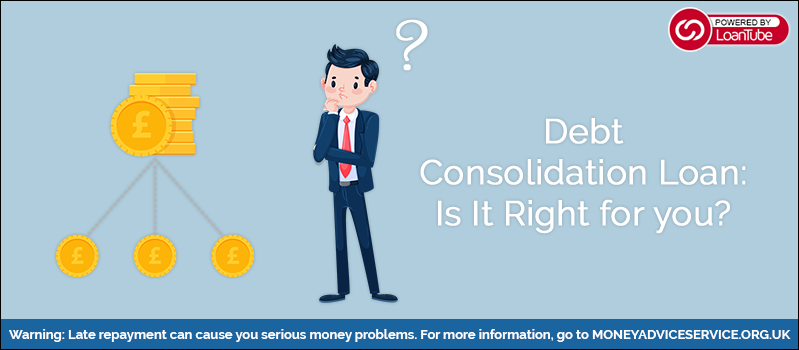Outstanding credit card balances, a pile of unmanageable debts are the real issues that households in the United Kingdom are struggling with. According to The Money Charity, the average total debt per UK household in October 2019 is £59,840. People in the country owed £1,665 billion at the end of October 2019, which is a worrying figure. With an increase of 0.18% in outstanding credit card debt, it has become more important than ever to keep a check on the finances. Taking on new debt may often seem to be very tempting, but it spirals too soon without you even realizing. One of the most convenient options to tackle the mounting debts is to consolidate them. In this article, we will discuss this financial tool that actually acts as a debt repayment strategy.
What is a Debt Consolidation Loan?
A debt consolidation loan, as the name suggests is a loan that is borrowed to repay all other existing debts. It allows you to merge your current debts into one so that instead of paying them separately, you can just make a single repayment every month. Do not confuse this with debt management as both are different and they work in a different manner altogether. It may also help you save some money on interests if you club high-interest debts together. It can be concluded that a debt consolidation loan is a personal loan that allows you to combine multiple debts and makes it easier and convenient for you to make the repayments.
What if you have a Bad Credit Score?
Alleviating financial stress can be difficult if you do not manage your finances the way it should be. A credit score is definitely one of the major parameters considered by the lenders while making their decision regarding your loan application, however, it is not the only factor they take into account. You will find a lot of advertisements by lenders offering “Debt Consolidation Loans for Bad Credit with No Guarantor”. The only catch in such offers is the rates of interest. Due to a poor credit score, the lender may not offer you a low-interest rate. Because when lenders check your credit profile and find that your score is low, they start putting you in the category of “risky borrowers”. That means you have the probability to default at the loan repayment and if you do so it will be a loss to them. Therefore, they charge a high rate of interest on the loan if you do not have a perfect credit score.
What happens if you have Too Much of Debt?
With around 8 million people struggling with problem debt, the United Kingdom is known as the “nation of debtors”. If you fail to keep up with the repayments, either the credit providers initiate the legal procedures for the recovery or you can do it voluntarily. Various debt advice organizations offer numerous debt solutions that you can choose to go ahead with to reduce your financial strain. Some of the legal procedures that can be initiated are:
County Court Judgement (CCJ)
A CCJ is a court order that asks you to make the repayment and clear off your debts. Your loan provider can use it as a debt collection process. You will get a time of 2 weeks to respond to the claim form or it may lead you to a serious financial issue.
Individual Voluntary Arrangement (IVA)
It is a contract that allows you to make affordable payments towards your debt. The time period that you get to repay your debt may vary from 5 to 6 years. At the end of the term, your debt is written off. But an IVA will be recorded on a public register that means if you apply for a loan in the future, it may get difficult for you to get one.
Debt Relief Order (DRO)
This debt solution is only available to residents of England, Wales, and Northern Ireland. This can be opted if you have a low level of debts and you do not have many assets. It freezes your debt repayment and interest that is charged on the debt for 12 months. If you’re a homeowner, you cannot apply for it.
Is a Debt Consolidation Right for you?
Using a single loan to pay off multiple loans eliminate the need for paying multiple checks that attracts multiple interest rates. It becomes easier to track the payments and you get enough financial space to create a budget so that you do not get off track in between. It is feasible if you have multiple credit card bills. Generally, the rate of interest offered on a personal loan is comparatively lower than credit cards. Hence, you will get an opportunity to save some money that you’re actually wasting by repaying more to towards your current debt repayment. It can be beneficial if you are making large repayments each month over a long period of time.
Final Takeaway
It does sound great to consolidate your debts into one but it has more angles to it and choosing it depends on your current financial circumstances. This solution is not “one size fits all”, so you need to be extremely careful when you consider consolidating your debts. Reduce your credit card usage and try to build a safety net for emergencies so that you do not have to be dependent on borrowing money only. If you think your debts are unmanageable, you should immediately contact debt counselling organisations such as Money Advice Service, StepChange, NationalDebtline for help. They are trained and seasoned professionals who will give you impartial advice on how to manage your debts. Taking out additional loans when you are knee-deep in other debts may not prove to be helpful always. Control your spending habits to achieve the financial freedom that you aim at and always take help from experts if you are confused.
To start your application with us, Click Here.



